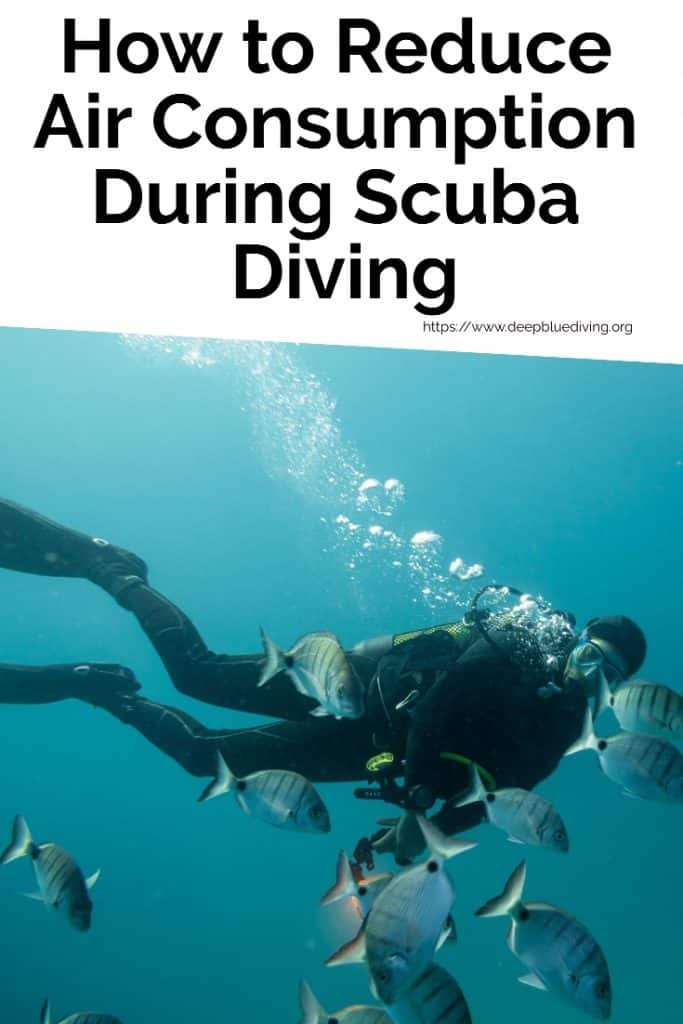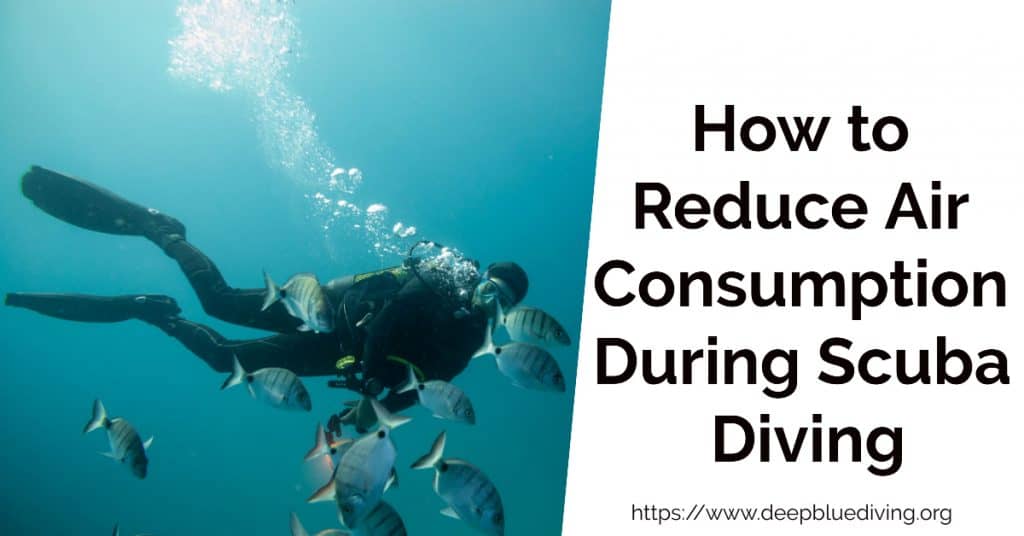Tips on How to Reduce Air Consumption During Scuba Diving
Are you frequently the diver that runs out of air fastest? If you regularly end up being the one to end a dive first, then check out the tips below that will help you reduce your air consumption during diving. Have a look at what you can do to change so that you’re improving your air consumption.
You might be wondering why it even is essential to make your air last as long as you can. Well, if you use lower amounts of air, then that means you can enjoy longer bottom times and maximize your overall dive time. Also, you don’t want to be the one diver that has to admit that you have the lowest amount of air left after a dive.
Why bother to improve your air consumption?
The most important reason is that you’ll end up having bragging rights back on the boat when you are having the most air left in your tank. Just kidding…
If you consume lower volumes of air, then you can dive longer. Or, you have a more significant safety margin compared to other divers. Both are good and important enough reasons to start working to improve your air consumption.
Diving in a group with a guide can also have its problems for the diver with the highest air consumption. Your guide will usually require the diver that reaches 1000 psi first to let him or her know. That is the signal to bring the group up safely again. Nobody wants to be that first diver that ends the dive for all.
You have three choices when you are that diver, though. First, you can let the guide know. That’s a reasonable thing to do at that time. Second, you can lie and put yourself at risk because you don’t want to be the one that ends the dive for all. That’s not such a smart choice. Third, you can work on consuming lower amounts of air so that you’re not the guy calling the dive in the future! This last point will take a while until you’ve practiced enough to improve your air consumption.
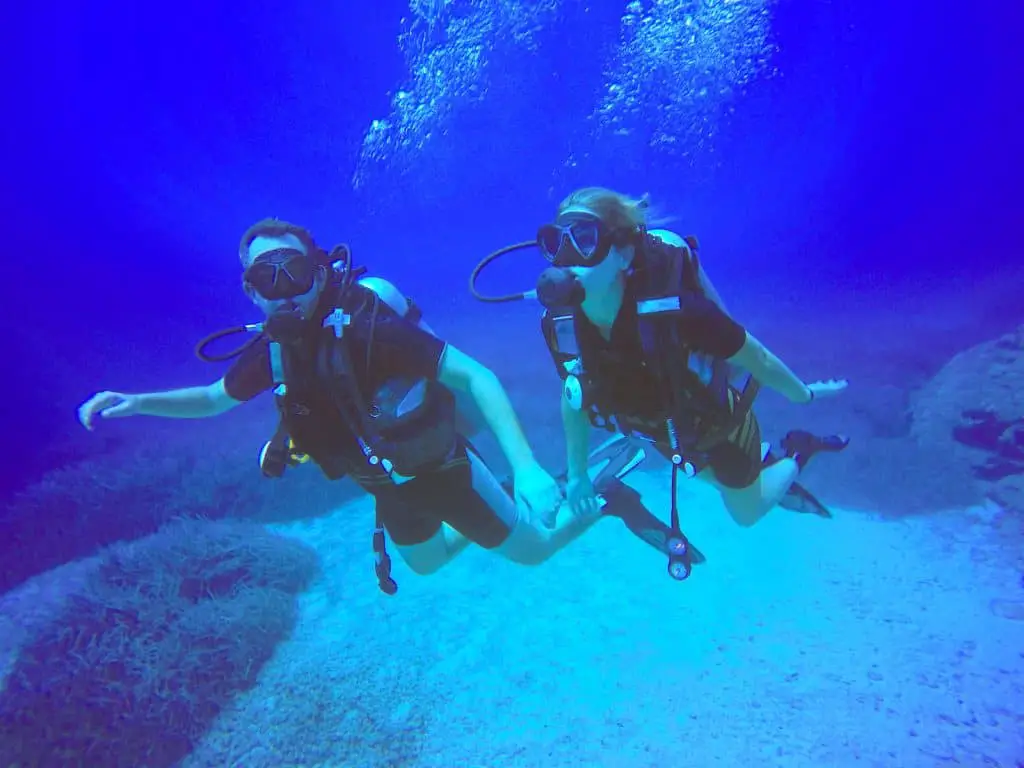
What factors can you not control?
There’s pretty much one factor that you, unfortunately, cannot change, which determines air consumption. It’s the size of your body.
Body Physique and its impact on air usage!
If you are 5 feet tall (short) and weigh 95 pounds, then you certainly need to optimize your air consumption when scuba diving compare to a 6’5 guy that weighs 250 pounds. Nature is just like that and the bigger person will use more air. There’s pretty much nothing you can do to change that part of the equation.
Stay in Shape and consume Less Air!
Now, if you are severely overweight and completely out of shape, then it’s pretty obvious what you can do yourself. Lose some weight and get some exercise onto the menu, and you will see steady progress with regards to avoid to use more air during a dive. Staying in shape is probably the best way for improving your air consumption when scuba diving.
Control the air consumption factors
There are several factors that you can control and influence. There are a few categories in which you can directly impact your air consumption.
- Leaking or otherwise malfunctioning dive gear (take special care of dive gear for kids!)
- Overall fitness
- Reducing air consumption while diving
These three major areas are usually under your control. There might not be instant ‘fixes,’ but over time, you can improve in those categories to reduce your air consumption.
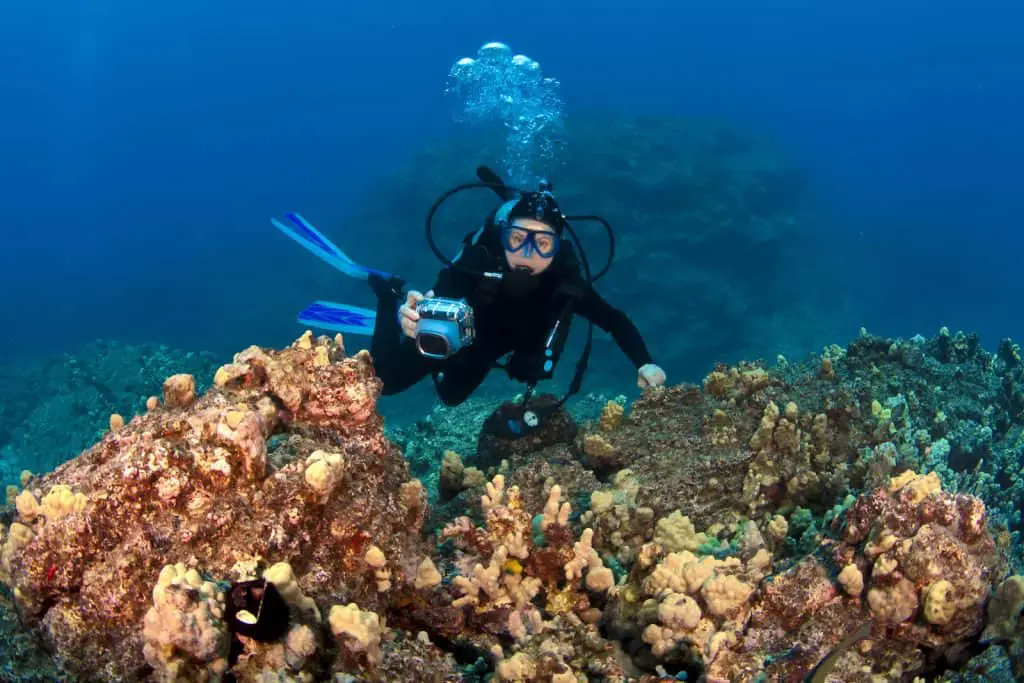
23 Tips to Reduce Air Consumption when Scuba Diving
Check out our tips below on what you can do to reduce your air consumption during a dive.
1 – Check for Leaks in your Scuba Gear
Check your scuba gear regularly for leaks to improve your air consumption. If you see bubbles or hear a hissing noise, then it’s time to find out where the hole is. Even if you don’t see a leak yourself, make sure that you have your gear checked regularly.
Ask your dive buddy to check behind you to find whether a tiny stream of bubbles is escaping from a worn-out O-ring. Also, check that your scuba diving mask sits tight and seals well. Masks that don’t sit perfectly are a huge gas leak that you’re scuba diving around with. Lastly, make sure that your octo doesn’t drain air unnecessarily.
Tiny leaks are usual. Your gear will never end up wholly leak-free, and you don’t have to worry about those tine air escapes. More substantial leaks can put you in danger, and you will end up running out of the air faster than you’d expect.
2 – Prepare your Scuba Diving Gear
It’s a good idea to prepare your gear in advance and to arrive at the dive site or the boat early. Getting to the dive site or boat late results in you running and carrying your gear at a fast pace, which in turn means you’ll be out of breath by the time you get to dive.
Knowing that you have everything you need and that you have time to kill allows you to relax, which means you will not be frantic and anxious at the time you jump in the water. Being calm and relaxed reduces your need for air tremendously and lets you enjoy your time underwater longer.
3 – Bring the Right Gear and Streamline
Consider the dive you’re going on and only pack the gear you need. Do you need a dive light? A spare snorkel? All of your other little gadgets? If not, then don’t bring them. Try to pack anything you have to bring close to your body instead of having it hanging off the O-ring of your BCD.
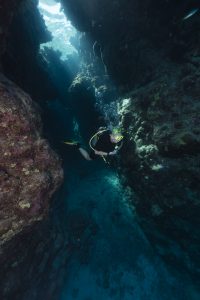
Anything you do not have to carry, and that is not essential to have, will slow you down. It’ll hang off of your BCD, and you end up being anything but streamlined. Imagine how fast a shark would swim if he’d have a ton of items hanging off of him! Leave at home what you don’t need and keep all other things tight to your body if anyhow possible.
Also, make sure that Octo’s and other scuba diving gear is tightly connected to your BCD and stays in place and is not dangling off of your body/BC. Keep hoses as short as possible. Make sure your console is close to your body.
4 – Get the best Fins
Once you think about it, it becomes pretty apparent that fins will have a significant impact on your air consumption. Cheap fins often are simply not as efficient in transferring your kick into forwarding motion, and the result is that you have to kick harder and/or more to get moving.
Good fins will significantly reduce the amount of energy spent on kicks to propel you in the water. The result is lower amounts of air spent and a more enjoyable dive. Check out the Scuba Fin Buying Guide for information on good fins as well as our overview of the Best Fins for Scuba Diving!
5 – Keep Your Gear Up-to-Date and Maintained
Make sure that all your scuba gear gets the maintenance required. Not only through checking for leaks but by simply making sure that all equipment is clean as well as overhauled on schedule. For example, your regulator should regularly be repaired and cleaned. Keeping your regulator maintained will make it easier to breathe, and as a result, you don’t waste air when breathing.
You also want to keep gear up-to-date. Technology is evolving, and you can find regulators that require less work when breathing compared to your old regulator from 15 years ago.
That doesn’t mean that you need to replace all your gear every couple of years, but it does make sense to keep an eye on new product introductions that could make your dives easier and more comfortable and, as such, improve your air consumption.
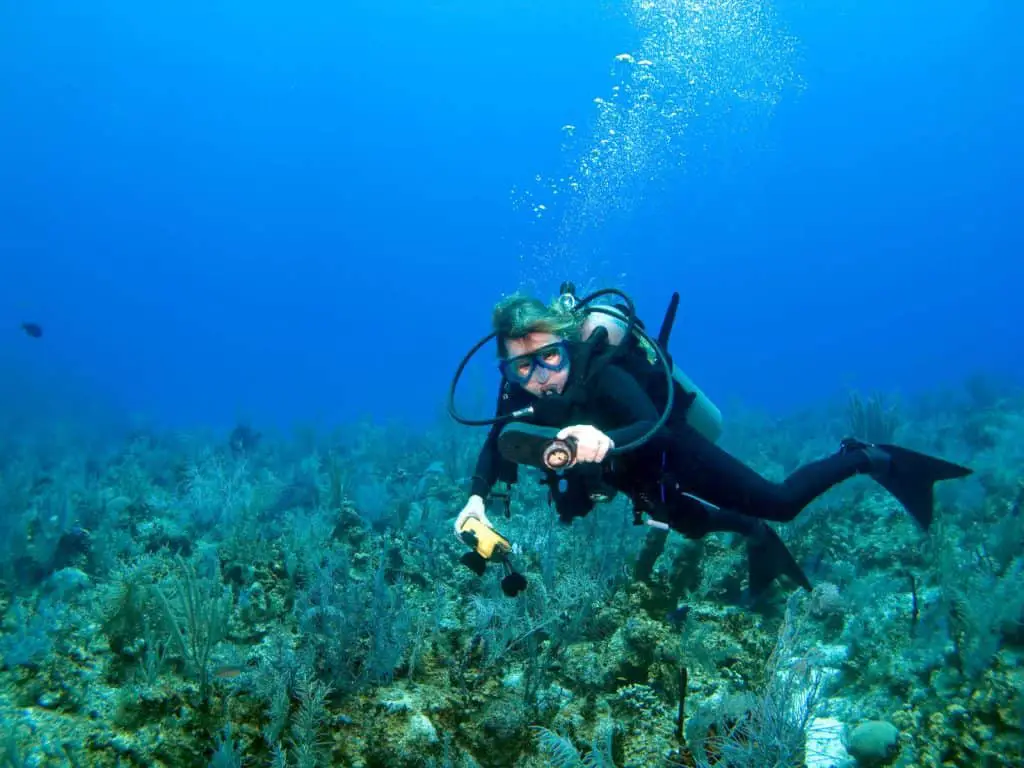
6 – Exercise Breathing and Calming Techniques
There are many ways to exercise breathing and to learn to calm yourself and relax. Being relaxed and knowing how to breathe efficiently will help you a lot to reduce your air consumption while you dive.
A great way to practice both at the same time is to start to meditate. Just spend a few minutes a day sitting in silence and then directing your focus on your breathing. You’ll quickly figure out to calm yourself faster and to control your breathing even in anxiety-provoking situations!
If you want to push yourself even further then learn some breathing techniques used for freediving. Learn the fundamentals of freediving breathing to help you consume lower amounts of air when diving.
7 – Continue your Education
Keep up with continuing your education by taking various dive courses and refreshers. It will make you feel more confident in your abilities, and you’ll be more comfortable when you dive.
Feeling more accomplished by passing more exams will grow your confidence. These courses will provide you with the technical knowledge to be a better diver. The increased knowledge and confidence will calm you underwater while you use less air.
8 – Improve your Fitness
Being in better physical shape helps. You reduce your weight and need less oxygen to keep yourself moving. Try to do some exercises that are specifically designed for diving.
Think of walking up a hill. If you’re not in shape, you’ll end up huffing and puffing. If you are physically fit, then your breathing will be more shallow, and you require less air. The same is true if you are diving and have to work hard to get through a current. Keep yourself in shape and reap the benefits by being able to dive longer with less air.
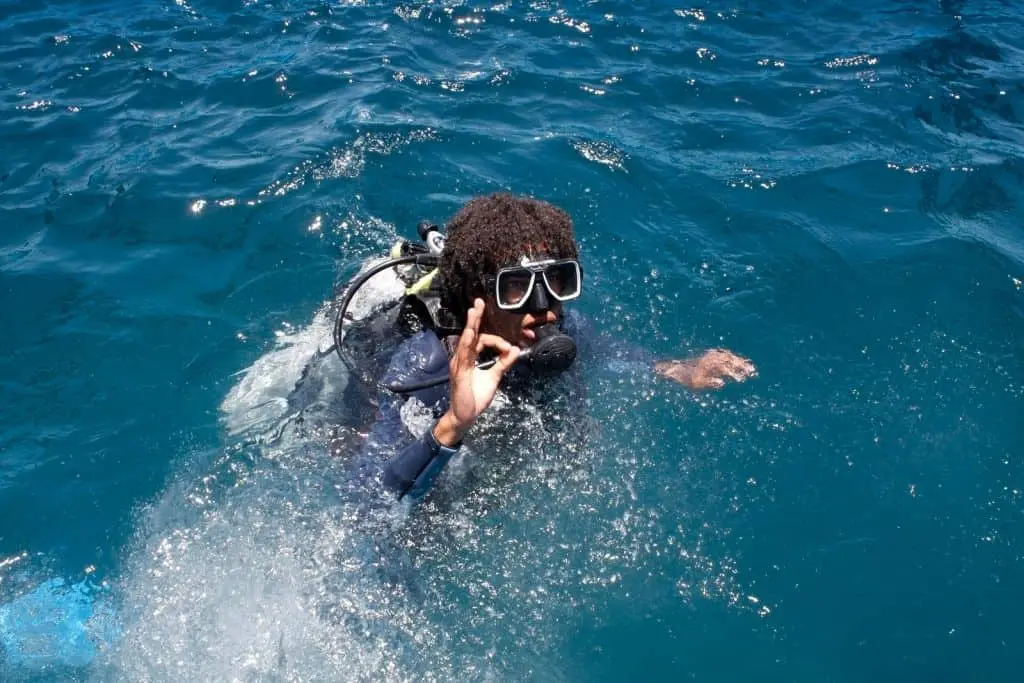
9 – Watch your Lifestyle
It should be pretty evident that alcohol and parties don’t mix very well with diving. Scuba diving after you drank too much the evening before is not only dangerous; it will also require you to consume more air as you are fatigued instead of being rested.
Not having enough rest will result in your body being exhausted, and you will automatically require more oxygen even if you’re not moving at all. Having a good night of sleep before a dive will make you feel refreshed and relaxed. You’ll dive calmer and on lower amounts of gasses.
10 – Dive More Often
The more experience you gain, the more confident you will be. Feeling ‘at home’ in the water will result in you being calmer, which in turn leads to reduced air consumption.
It is a known fact that inexperienced divers burn through their air supply much faster than divers with experience. Inexperience leads to being nervous, which leads to breathing quicker and harder. By simply diving more, you’ll gain the knowledge to lose your nervousness and to breathe calmer.
11 – Use your Snorkel
When you’re swimming on the surface, then switch from your regulator to your snorkel. Breathe surrounding air instead of emptying your tank. If you end up swimming in choppy water, then make sure that you have a dry snorkel to use.
It’ll keep the water out while you conserve air. You’ll be surprised how much longer you’ll be able to stay underwater by using a snorkel when you’re on the water.
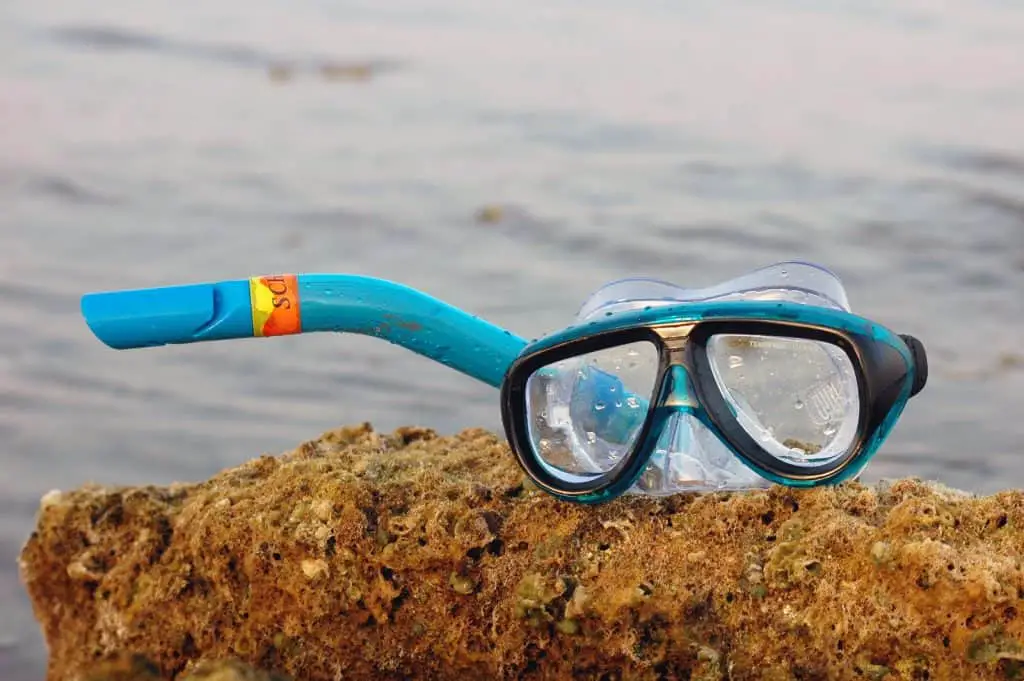
12 – Take it slow
Trying to swim fast during a dive will cost you a ton of energy. It’s exhausting to go fast underwater. If you double your speed, you will increase your drag by a factor of four and need up to eight times the energy.
That additional energy requires a lot more air than taking it slow and enjoying your dive. Slow and steady is the name of the game that allows you to surface last and with the most air left.
13 – Keep Your Hands to Yourself
Well, not literally, but keep your arms close to your body. Streamlining underwater and using your fins to propel you forward will reduce drag and reduce the energy you need to dive.
Using your hands to swim is pretty ineffective. Simply compare the size of your hands with your fins. Which will get you moving?
14 – Stay Shallow
Yes, you want to dive, but the deeper you go, the more air you consume. Remember that from your first dive course? You often get a better view of a coral reef or other sights when staying a few feet higher than the rest. And surprisingly, you’ll be the one consuming a lot lower amounts of air.
When you’re crossing over some uninteresting area, then go more shallow to pass to save air. Swimming over a section of bare send is as ‘interesting’ when you’re doing it at 15 feet vs. 30 or 40 feet. You won’t miss anything, but you’ll extend your time underwater to be able to see the things that are worth seeing.
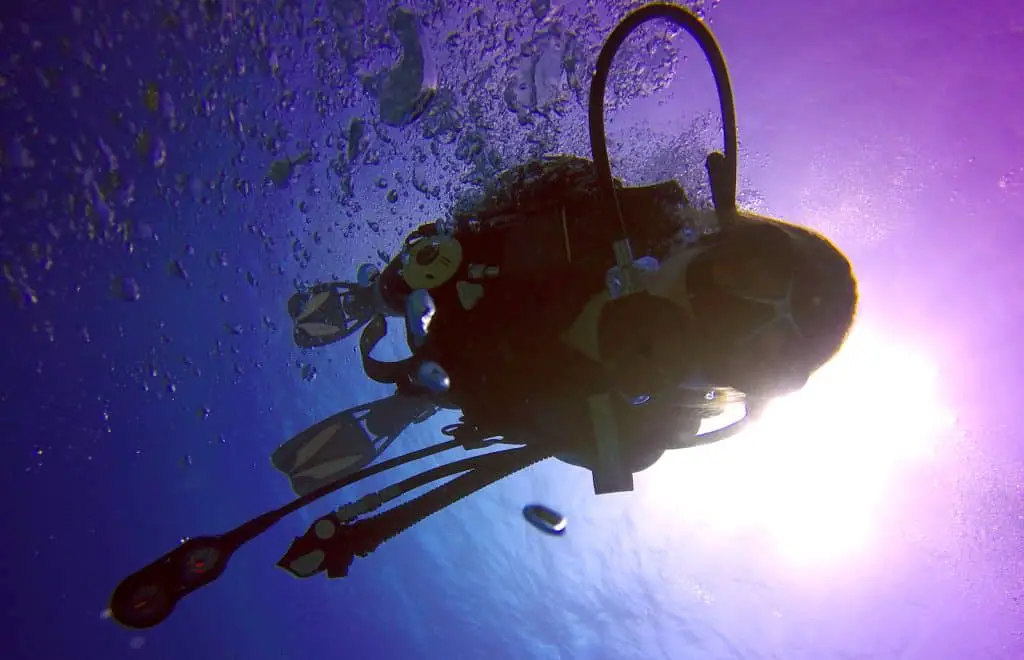
15 – Ear Equalizing
Somehow divers tend to blow off lots of air during a descent. There’s a lot of air wasted when equalizing or clearing your ears and blowing off the air at that time. Try to reduce the amount of air you blow off when clearing your ears, and you’ll be able to dive longer.
16 – Optimize your Weight
Many divers end up diving with too much weight. At that moment, you have to fill your BC with more air to be neutral, and that unnecessarily sucks the air out of your tank.
Besides, the BC will end up bulkier and produces more drag, which in turn means that you need more air to dive. Optimize your weight to the minimum amount necessary, and you’ll enjoy a more prolonged and less strenuous dive.
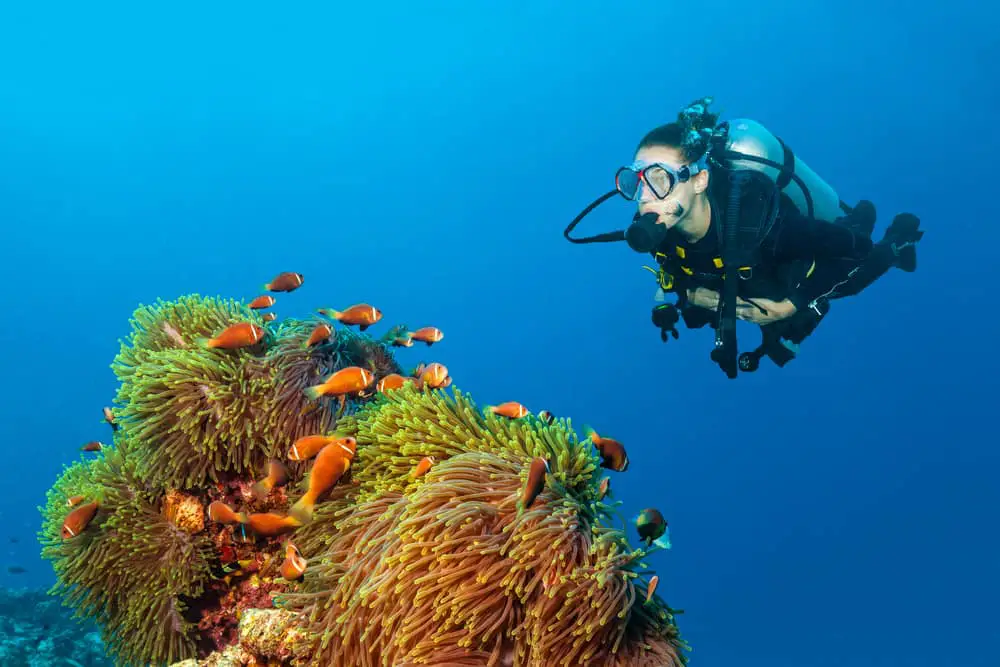
17 – Neutral Buoyancy
When you master to keep neutral buoyancy, then you need less adjusting with your fins to maintain a constant depth. You conserve a lot of energy that way and won’t always fight to keep off the bottom or float to the surface.
In neutral buoyancy, you glide between fin strokes and stay at the same depth without effort. It makes the dive more enjoyable and prevents you from burning through your air when you master buoyancy control. PADI and other organizations offer training and courses to master peak performance buoyancy.
18 – Keep your Position
Adjust your trim so your body points in the direction you want to go. If you swim forward, then make sure your body stays horizontal. That way, your head, and shoulders break your body through the water, and your legs and fins don’t have to fight water resistance. The less water you disturb, the less energy and air you need.
19 – Keep Warm
When you’re cold, you will consume more air. Your body spends energy on staying warm, which requires oxygen. If you wear a wetsuit that matches your dive parameters, then you’ll stay warm, and your body doesn’t need to spend the energy to heat up.
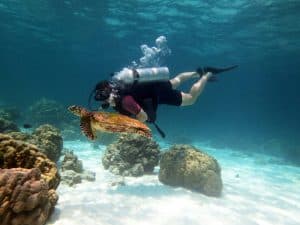
Don’t forget that even in ‘warm’ water, your body will lose temperature and work hard to keep you warm. If you’re diving in anything less than 95’ish degree water, then the surrounding water will take the heat out of your body.
Getting or being cold will also cause you to stress, which in turn often increases the rate of breathing. Most people simply get mentally stressed when they get cold. If you are not relaxed and your body is trying to stay warm will use a lot of air.
20 – Deep and Slow Breaths
Don’t get in the habit of taking short, shallow breaths. Slow and deep breathing allows getting more oxygen to your lungs and into your body. Breathing shallow creates fatigue resulting in you breathing heavier and more.
Breathing right comes back to your breathing exercises. Slow and deep like you meditate or like you’re doing yoga. It provides your body with the necessary oxygen without wasting air.
21 – Relax and Enjoy
Enjoy your dive. Don’t obsess over things that are out of your control, and don’t get into the water when you’re stressed out. Chill out and relax. Enjoy the ride, and when you’re underwater, just chill out and have a good time.
Don’t obsess with your breathing, your trim, etc. Any obsession with any of these things will lead you to get anxious and stressed, which will increase your rate of breathing.
22 – Plan Ahead
Plan your dive ahead of time. You can’t plan everything but plan the outline and be confident that you can master it. The confidence boost and planning will automatically reduce your anxiety level and breathing.
Having a solid plan is specifically important when you do more challenging or technical dives. Think of a cave or wreck dive. Get the information you can get and then plan to dive the cavern or wreck ahead of time.
Play through the dive in your head ahead of time, and you’ll run into fewer surprises. Fewer surprises mean you’ll stay calmer, and you won’t burn through your air.
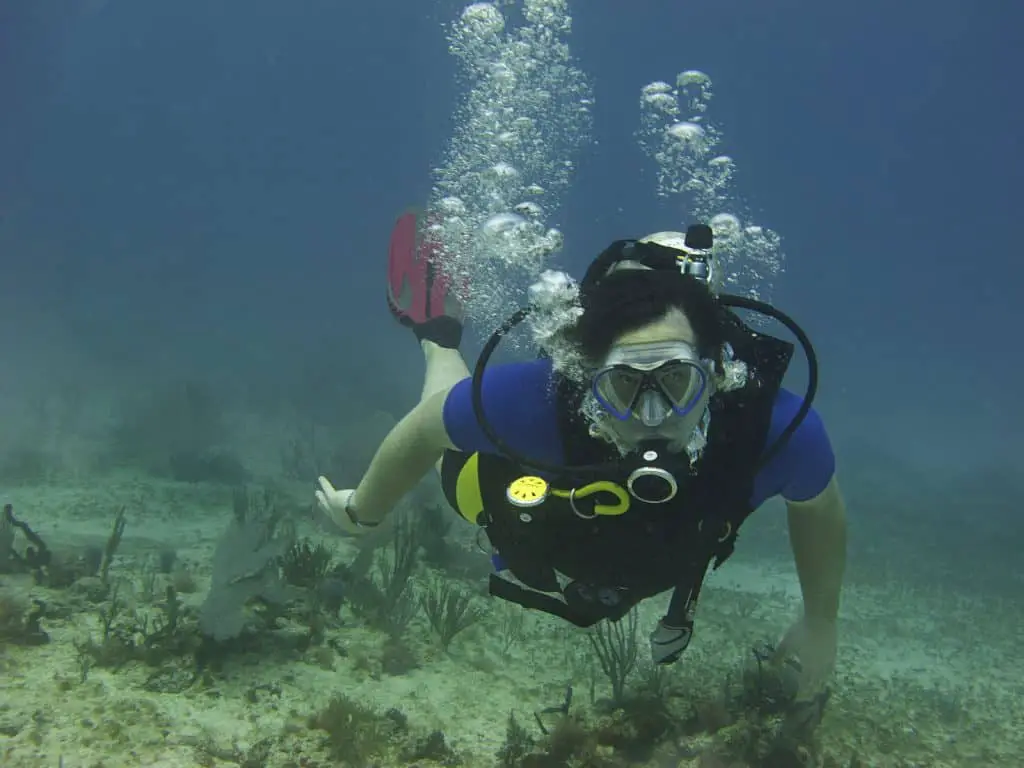
23 – Analyze
An excellent way to monitor your breathing pattern and figure out where and when you start to breathe heavy and burn air is by using an air integrated dive computer. Most of those will record your air consumption with each sample taken while you’re scuba diving.
Using this recorded data allows you to analyze where and when you started to consume more air and will help you with reducing your air consumption rate. Knowing the situations where it happens helps.
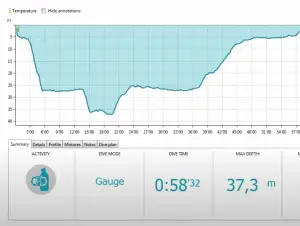
It will either allow you to avoid those circumstances or to be mentally prepared when they arrive. That preparedness will result in you staying calm and not starting to increase your air consumption.
Teach yourself to consciously keep an eye on your gauge while diving and to watch your breathing pattern. This can help you find out when you consume more air. It can help understand when you can optimize your diving and breathing to use less air.
Wrapping it up
Just keep those tips and recommendations in mind for your next dives. You don’t need to follow all of them to improve your air consumption. Just start with one or two and see how it goes.
Get small wins by following one or two of the suggestions and advice, and you’ll end up being able to dive longer than before. Just following a single tip will help you improve your air and gas usage and breathing skills. Eventually, you’ll master many of these suggestions and be the diver that outlasts your buddies or has the most air in the tank at the end of the dive.
Most important, though: Have fun and enjoy your dives!
We hope you enjoyed our tips and will use some of them to help you consume less amounts of air on your future diving trips!
